|
|
|
click to open/close |
Anthroposophia
instances of the word used prior to Steiner |
|
ΑΝΘΡΩΠΟΣΟΦΙΑ
ανθρωποσοφια
. o 0 o .
'From Zimmermann, as you know, is derived the word Anthroposophy, though his Anthroposophy is a tangled undergrowth of abstract concepts.'
R. Steiner Karmic Relationships Vol. IV p.95
1510: Cornelius Agrippa [though some claim for his usage of the term, the only reference I can locate is in the much later English edition in the foreword by Thomas Vaughan, referring to his own book mentioned below].
1650: Anthroposophia Theomagica by Eugenius Philalethes (Thomas Vaughan)
| |
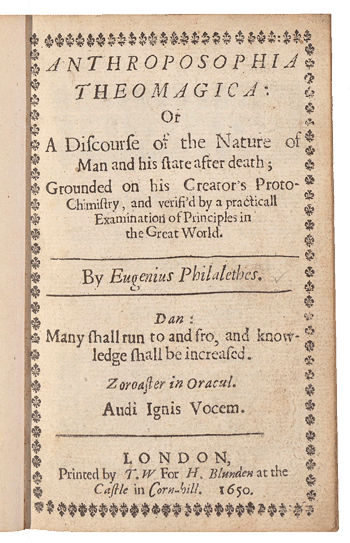
|
|
ANTHROPOSOPHIA
THEOMAGICA:
Or
A Discourse of the Nature of
Man and his state after death;
Grounded on his Creator's Proto-
Chimistry, and verifie'd by a practicall
Examination of Principles in
the Great World
By Eugenius Philalethes
Dan:
Many shall run to and fro, and know-
ledge shall be increased.
Zoroaster in Oracul.
Audi Ignis Vocem.
LONDON,
Printed by T.W For H. Blunden at the
Castle in Corn-hill. 1650 |
|
1720s: Though it has been claimed that Nathan Bailey includes an entry for the term 'Anthroposophy' in his dictionary, it appears neither in the 1731 nor the 1756 editions (the only two I have been able to consult).
1804: Schelling, in his System of the Whole of Philosophy and the Philosophy of Nature [or rather: Natural Philosophy ie., Science] in Particular (Würzburger System der gesamten Philosophie und der Naturphilosophie insbesondere) uses the term Anthroposophy.
| |

|
|
[translation forthcoming] |
|
1828: I.P.V. Troxler (1780-1866) writes in his Naturlehre des menschlichen Erkennens, oder Metaphysik (quoted in G. A. Bondarev's Rudolf Steiner’s ‘Philosophie der Freiheit’ as the Foundation of Logic of Beholding Thinking)
But a time will come, and it is close at hand, when Anthroposophy will explain to the spirit the natural phenomena of the spirit-realm in man, just as physics explains the rainbow to the sense of vision and the Aeolian harp to the ear.
From the same Troxler source, ie, his Naturlehre des menschlichen Erkennens, oder Metaphysik, is also found this:
| |
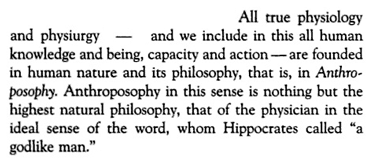
|
|
All true physiology and physiurgy – and we include in this all human knowledge and being, capacity and action – are founded in human nature and its philosophy, that is in Anthroposophy. Anthroposophy in this sense is nothing but the highest natural philosophy, that of the physician in the ideal sense of the word, whom Hippocrates called "a godlike man." |
|
It should be noted that Steiner refers to Troxler's Lectures in Philosophy (Vorlesungen über Philosophie) of 1835 that again uses the term. Steiner's reference is in the afterword to the publication of two lectures he gave in 1916 (GA 35) titled Approaches to Anthroposophy. The next instance below is also referred to by Steiner in the same source:
1860: I.H. Fichte, in his Anthropology, uses the term 'Anthroposophy' a number of times, including on page 114, and again in the final couple of pages of the book, to which Steiner refers in the Afterword to the publication of two lectures given in 1916 (GA 35):
| |
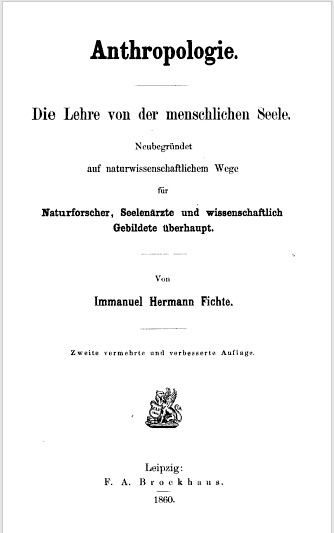
|
|

In the work of I. H. Fichte, the son of the great philosopher, (in his Anthropologie, second edition 1860, p. 608), we find the following sentences: 'Anthropology ends in the result this is confirmed from various quarters, that the true nature of man's being and the real source of his consciousness belong to a supersensible world. But sense-consciousness and the phenomenal world which appears before his eyes, together with the whole of the life of the senses, have no other importance than merely to be the place where that supersensible life of the spirit is enacted, by his bringing the spiritual content of ideas into the sense-perceptible world through his own free, conscious act. … The final result of this fundamental comprehension of human nature raises "anthropology' to "Anthroposophy".' In connection with the explanation of these sentences I. H. Fichte says (p. 609): 'Thus inthe end, Anthroposophy itself is only able to find its final conclusion in Theosophy'. |
|
1863: included in Notes and Queries Vol. 3 3rd S. (71) May 9 1863 Page 373 with regards the writing of Jacob Boehme is the following:
| |
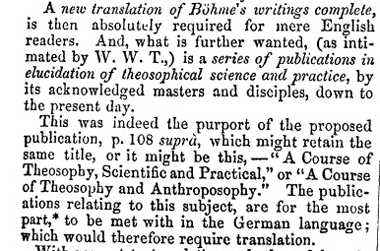
|
|
A new translation of Böhme's writings complete, is then absolutely required for mere English readers. And, what is further wanted, (as intimated by W.W.T.,) is a series of publications in elucidation of theosophical science and practice, by its acknowledged masters and disciples, down to the present day.
This was indeed the purport of the proposed publication, p. 108 suprà, which might retain the same title, or it might be this, – "A Course of Theosophy, Scientific and Practical," or "A Course of Theosophy and Anthroposophy." The publications relating to this subject, are for the most part,* to be met with in the German language; which would therefore require translation. |
|
1882: Robert Zimmermann Anthroposophie im Umriss. Entwurf eines Systems idealer Weltansicht auf realistischer Grundlage. It should be noted that Steiner studied under Zimmerman around that time (and see the quote heading this page).
| |
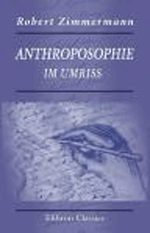
|
|
Title:
Anthroposophy: An Outline Sketch of an Idealistic Worldview on a Realist Foundation |
|
|